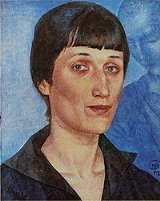
and Soviet
modernist poet, one of the most acclaimed writers in the Russian canon
.Harrington (2006) p11
Akhmatova's work ranges from short lyric poems to intricately structured cycles, such as Requiem (1935–40), her tragic masterpiece about the Stalinist terror
.
O let the organ, many-voiced, sing boldly, O let it roar like spring's first thunderstorm! My half-closed eyes over your young bride's shoulder Will meet your eyes just once and then no more.![]()
I go forth to seek — To seek and claim the lovely magic garden Where grasses softly sigh and Muses speak.![]()
You thought I was that type: That you could forget me, And that I'd plead and weep And throw myself under the hooves of a bay mare...![]()
Damn you! I will not grant your cursed soul Vicarious tears or a single glance. And I swear to you by the garden of the angels, I swear by the miracle-working icon, And by the fire and smoke of our nights: I will never come back to you. ![]()
I don't know if you're alive or dead. Can you on earth be sought, Or only when the sunsets fade Be mourned serenely in my thought? ![]()
No-one was more cherished, no-one tortured Me more, not Even the one who betrayed me to torture, Not even the one who caressed me and forgot.![]()
Why is this century worse than those others? Maybe, because, in sadness and alarm, It only touched the blackest of the ulcers, But couldn't heal it in its span of time.![]()
All has been looted, betrayed, sold; black death's wing flashed ahead.![]()
You will hear thunder and remember me, And think: she wanted storms. The rim Of the sky will be the colour of hard crimson, And your heart, as it was then, will be on fire.![]()
That day in Moscow, it will all come true, when, for the last time, I take my leave, And hasten to the heights that I have longed for, Leaving my shadow still to be with you.![]()

